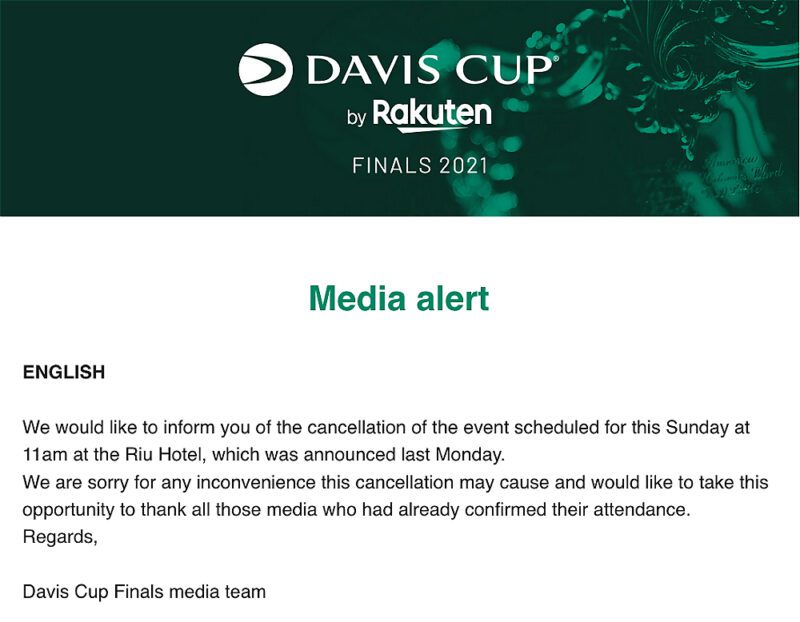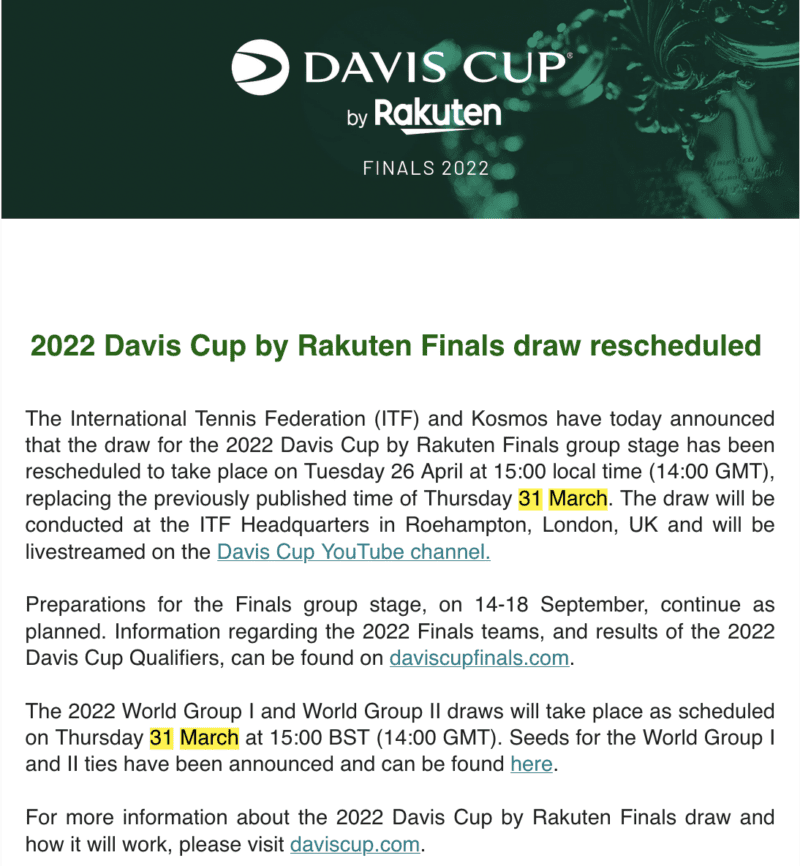
–
Every time the “new” Davis Cup configuration seems to send the historic competition down the path to even greater irrelevance, something comes along that puts pedal to metal to accelerate that process.
And this 2022 edition has already been plenty fraught with drama.
The first clue that things were getting complicated in Davis Cup land was that the International Tennis Federation and Kosmos were prepared to announce Abu Dhabi as the site of the 2022 Davis Cup finals.
The press conference was set for Dec. 2. 2021, during last year’s edition.
It didn’t happen.

Malaga a “compelling bid”, per Kosmos
Finally, on April 8 – four long months later – Kosmos and the ITF announced that Malaga, Spain was out as one of the four announced group stages hosts.
You see, it was “promoted” to host the “knockout stages” of the Davis Cup finals from Nov. 21-27.
“Malaga and Andalucía have opened their doors to host the knock-out stage of Davis Cup by Rakuten Finals and we will support them to become the tennis capital of the world hosting the eight best teams in November. We will work together with the partners to offer an unforgettable experience to players and fans from all over the world,” was the statement from Kosmos’s Albert Costa.
This is a two-year deal for 2022 and 2023.
Prior to that, in February, it was announced that the finals would not be held all at once in one place. No doubt it was fairly clear last November that the extended period of time set aside for the finals contained a silly amount of dead space, for players who were already on fumes).
Instead, the “preliminary group stages” would take place in September, thus shortening the finals part still on track for November.
And, of course, widening the pool of potential candidates to host an indoor tie in November.
The original format was fine in Madrid’s Caja Magica, which has three roofed stadiums. But they had to completely re-do the place and turn a clay-court venue into a hard-court venue. And it appeared to be a one-off.
Spreading tennis to “new places”
It wasn’t long ago that Kosmos maintained that after the first two years in Madrid, the Davis Cup Finals would be taken to tennis places around the world, to spread the gospel of tennis.
When the group-stage cities were announced in March, they even reiterated this notion.
“The 2022 Finals embrace an all-new set of locations, in fitting with the Davis Cup tradition of bringing the nation-versus-nation event to countries across the world,” the statement read.
Well, perhaps that “set of locations” is new to … Kosmos. But these are hardly “new” to Davis Cup. Malaga – as the ITF and Kosmos write in their own statement – hosted the 2003 semifinals. And the Andalucia region hosted the 2004 and 2011 Davis Cup finals in Seville. It also hosted the Spain vs. Romania qualifier last month in Marbella.
Okay, Kosmos – not so new
Glasgow has hosted before, notably the tie between Great Britain and the U.S. back in 2015.
Italy and Germany have been the scene of innumerable Davis Cup ties over the history of the event.
So, objectively, none of these sites are actually “new”.
Notably, the U.K.’s winning bid for a group-stage pool was reported as being for … five years (*depending on the country’s involvement in the competition).
And absolutely, the fact that Kosmos is a Spanish company and a Spanish city was selected on the basis of a “compelling bid” is totally transparent.
(And no, you’re not losing your mind if this announcement didn’t set off fireworks. The “knockout stages” doesn’t sound anything like the “Davis Cup finals”. To be honest, it sounded like just another “preliminary” step in this increasingly fractured competition. And then you realize, ‘Whoa, that’s the FINAL. In SPAIN. Again).
Where will the prelims be held?
The next clue that things were getting complicated behind the scenes was when the draw for the four group stage pools, set for March 31, was postponed until April 26.
That announcement, made March 28, came without explanation.

Meanwhile France, a great tennis nation, claims it was excluded from the bidding process for those four cities, for reasons that seem unclear.
In the end, Malaga (Spain), Hamburg (Germany), Bologna (Italy) and Glasgow (Scotland) were selected as the host cities for the group stages, to be held Sept. 14-17.
(Until Malaga was promoted, of course)
FFT appeals to the CAS
On March 16, the French Tennis Federation appealed to the Court of Arbitration for Sport to have its “right to participate in the bidding process for the group stages” recognized.
Then, on March 17, the ITF announced the four pools, and that Canada would receive a wild card into the finals as defending champion Russia would not be allowed to compete.
On April 11, the CAS responded, surprised that the FFT considered itself an injured party since it was the one that failed to follow up on emails send by Kosmos and the ITF dated Jan. 26 and Feb. 15.
Per the CAS, those communications stipulated that nations had to take position by Feb. 18 – and that 18 of the 26 countries involved had made that deadline.
On April 13, the ITF and Kosmos officially announced a decision taken a few days earlier, that Málaga was out as one of the four group stages hosts because of the promotion.
And now, at least the site for the FINAL Finals is determined. But there’s still a hole to fill.
(Yes, you’re right to think the thing is a circus. In just a few years, the Davis Cup has gone from being home-and-away ties in the various nations involved, to having the entire Finals event hosted in Madrid. And then, to having the preliminary phases hosted by three different cities in 2021 – one of them behind closed doors. To now, in 2022, having group stages in September in four different cities, and then preliminary knock-out ties in … another city that was not the original expected city, but indeed one of the four original “group stages cities”.)
The fourth city will be …
The deadline for submissions to be the fourth host city is April 21, this Thursday.
Any host nation that hasn’t already been pegged is eligible to submit a bid: Australia, Argentina, Belgium, Canada, Croatia, France, Kazakhstan, Korea Republic, Netherlands, Serbia, Spain, Sweden and USA.
The other three group stages being held in Europe (or close, Scotland) and the fourth being in … Korea, or Argentina, or Australia. Or even Canada, with the likelihood of its top two players taking part being fairly remote.
That makes sense.
You could make an argument for the U.S., since the group stages are held right after the US Open.
The “winner” will be announced before the April 26 pools draw in Málaga.
The statement from the ITF: “Málaga was successful in its bid to host one of the four venues for the group stage of the 2022 Finals on 14-18 September but has now been selected to host the knock-out stage in November for two years, following a compelling bid to the ITF and Kosmos Tennis.”
(The sportsnewspaper L’Équipe stated last week that it was more that Kosmos reached out to Málaga, and not the reverse).
And now – France is publicly out
In the wake of its appeal to the CAS, the FFT was then included in the bidding process to replace Málaga, a “new procedure put in place by the ITF and Kosmos” that took “into account the criticisms made by the FFT” in its appeal.
But … on Monday, the French Federation issued a statement announcing it will not submit a bid, after going to such lengths to get that right.
And it is withdrawing its appeal to the CAS.
From the FFT:
“After finally being able to review the complete specifications in the designation of the host cities of the Davis Cup Group Stages, the FFT has decided not to submit a bid in view of the onerous financial and operational conditions which no potential organizer in the French territory was willing to accept,” the statement read.
“The FFT’s desire to promote and revitalize the Davis Cup is stronger than ever. In the interest of this competition and of tennis, the FFT wishes to contribute to the reflection on the sporting format of the competition and the evolution of its economic model to make it more attractive, within the framework of a governance that respects the values and spirit of the Davis Cup.”
Confused yet? You’re not alone
Basically, they’re telling all the other prospective cities – without saying it out loud. Well, they actually are kind of saying it out loud – that it’s a dog’s breakfast of overambitious financial demands and clueless logistical requirements. And to steer clear.
One detail that appears limiting is that the host is required to supply an indoor venue, and play on hard court.
Despite the fact that former FFT president Bernard Giudicelli voted “YES” with France’s 12 Grand-Slam level votes for Kosmos to take over the Davis Cup and basically obliterate it, the French as a group love the competition as the tennis purists they are.
The country’s players (along with Australia) have been the most outspoken about the desecration of it.
Oh, and there’s also this:
Gerard Pique accused of making almost £5m from taking Spanish Super Cup to Saudi Arabia. @Tom_Morgs reports.https://t.co/XOTEpYDe2g
— Telegraph Sport (@TelegraphSport) April 18, 2022
And the biggest question remains: the arrival of Kosmos promised massive increases in the payments to national federations for their participation in Davis Cup.
And while it was pretty inarguable that something had to change, to return the event to eminence and profitability, it hasn’t turned out that way.
But it was enough to convince a lot of countries (including Canada) to vote for the change.
But those payments, of course, were entirely dependent on the success of the event. And to this point, it’s hard to argue that it has filled the coffers.
Said new FFT president Gilles Morretton, after France beat Ecuador to reach the final phase: “We’re learning things, for example the reduction of the remuneration for players in this competition. We sometimes have a hard time understanding it all,” he said. “I’ll say it again; there were other roads to consider before getting to this point.”
Also notably, per L’Équipe, the players were not remunerated by the FFT/Kosmos for the ties played last month. In France’s case, the federation itself had to pony up some Euros. Lesser federations, you would think, might not have that cash.
Even at the very beginning, promised payments by Kosmos were delayed for months.
To be continued …

More Stories
WTA Tour – Tuesday, Sept. 30, 2025 final results
ATP Tour – Tuesday, Sept. 30, 2025 final results
ATP Tour – Monday, Sept. 29, 2025 final results